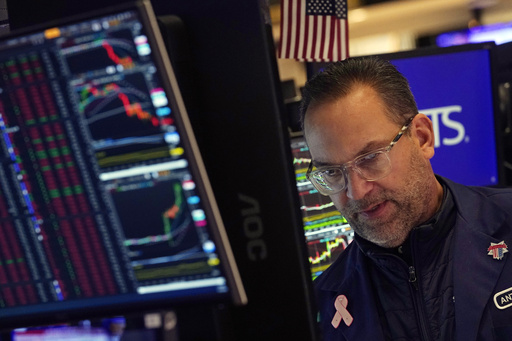
NEW YORK — U.S. stock markets witnessed an early surge on Thursday, only to lose momentum as the day progressed, resulting in mostly flat outcomes for the major indexes.
The S&P 500 dipped by 0.1% after a substantial fall of 2.9% on Wednesday, ignited by the Federal Reserve’s indication that interest rate cuts for the next year may be considerably fewer than previously anticipated. Earlier in the day, the index was up by as much as 1.1%. In comparison, the Dow Jones Industrial Average saw a minor gain of 15 points, or less than 0.1%, following Wednesday’s significant decline of 1,123 points, while the Nasdaq composite also dropped by 0.1%.
This week’s fluctuations in stock prices have dampened market enthusiasm substantially, as critics suggest that the current market valuations have been too optimistic, needing a series of favorable conditions to remain justified. Despite the recent downturns, major indexes are still close to their record highs, with the S&P 500 positioned to achieve one of its best annual performances of the century, boasting a 23% increase.
Market analysts are now forecasting that the Federal Reserve might only enact one or two interest rate cuts next year, according to data analyzed by CME Group. Some traders are even wagering that no cuts will occur. Just a month ago, the consensus leaned towards at least two cuts being a likely outcome in 2025.
Lower interest rates are typically welcomed on Wall Street as they can stimulate economic growth and increase investment valuations. However, such rates also have the potential to incite inflationary pressures.
Micron Technology emerged as a significant drag on the S&P 500 on Thursday, plummeting by 16.2% despite reporting better-than-expected profits for the latest quarter. The computer memory manufacturer fell short of revenue projections of Wall Street, and its CEO, Sanjay Mehrotra, cautioned that consumer demand is expected to remain subdued in the short term, offering a revenue forecast that disappointed analysts.
Similarly, Lamb Weston, known for its French fries and potato products, witnessed a sharp drop of 20.1% after missing profit and revenue expectations. The company altered its fiscal year targets, citing a continuing decline in demand for frozen potato products, particularly outside of North America, and announced a change in its chief executive officer.
These setbacks overshadowed positive news from Darden Restaurants, the parent company of Olive Garden and other dining chains, which saw its stock soar by 14.7% after surpassing profit expectations and providing a revenue forecast that exceeded what analysts anticipated.
Accenture also reported a 7.1% hike in its stock after beating profit expectations, with its CEO Julie Sweet highlighting global growth and increasing revenue forecasts for the fiscal year.
Amazon shares ticked up by 1.3%, despite seven of its facilities experiencing strikes by workers during one of the company’s busiest seasons. The online retail giant stated that it does not foresee any significant disruptions as the workers’ union described the action as the largest strike against Amazon in U.S. history.
In the bond market, the situation was mixed following a rise in yields the previous day, prompted by the Fed’s indications of fewer rate cuts in the coming years. Reporting on the U.S. economy presented a mixed bag; one report indicated that overall economic growth during summer accelerated to a 3.1% annualized rate, which was faster than prior estimates. The economy has shown considerable resilience even amid high interest rates held for two decades before a recent easing started in September.
Another report indicated a decrease in unemployment benefit applications, suggesting a strong job market. However, a separate report revealed unexpected contraction in manufacturing within the mid-Atlantic region, defying growth expectations.
The yield on the 10-year Treasury rose to 4.57%, up from 4.52% reported late Wednesday and significantly from less than 4.20% earlier this month. Meanwhile, the two-year yield, closely tied to short-term Fed actions, declined to 4.31% from 4.35%.
The recent increase in long-term yields has placed pressure on the housing market by maintaining elevated mortgage rates. Homebuilder Lennar’s stock fell by 5.2% after posting weaker-than-expected profits and revenues. CEO Stuart Miller remarked that the anticipated housing market improvement due to short-term rate cuts turned out to be more difficult as mortgage rates rose during the quarter.
Despite the challenges, a report indicated a boost in sales of previously owned homes, offering a glimmer of hope for the housing sector.
Overall, the S&P 500 decreased by 5.08 points, settling at 5,867.08. The Dow Jones Industrial Average increased by 15.37 to end at 42,342.24, while the Nasdaq composite saw a reduction of 19.92, concluding at 19,372.77.
Internationally, London’s FTSE 100 dropped by 1.1% following the Bank of England’s decision to pause rate cuts and keep its primary interest rate stable, amid rising inflation that exceeds the central bank’s 2% target. Tokyo’s Nikkei 225 fell by 0.7% as the Bank of Japan maintained its benchmark interest rate as well. Markets across much of Asia and Europe generally declined.
